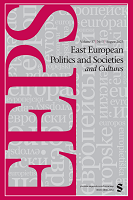Factors in National Self-Designation of Slavic Muslims in the Montenegrin Sandžak
Factors in National Self-Designation of Slavic Muslims in the Montenegrin Sandžak
Author(s): Mehmed Đečević, Danijela Vuković-ĆalasanSubject(s): Politics and religion, Politics and society, Social Theory, Sociology of Culture, Sociology of Politics, Politics and Identity, Identity of Collectives
Published by: SAGE Publications Ltd
Keywords: Bosniaks; ethnic Muslims; national identities; constructivism;
Summary/Abstract: National fragmentation of Slavic Muslims in the Montenegrin area of the Sandžak region into Bosniaks and national Muslims was recorded in the last two population censuses in Montenegro, with minor differences in the two sets of results. Therefore, the following question emerges: what are the social and political factors, prevalent in the Montenegrin area of the Sandžak region, that drive national self-identification of Slavic Muslims in this region either towards Bosniakism (national Bosniaks) or national Muslimhood (national Muslims). In the Montenegrin sociopolitical discourse in the relevant period, the social constructs “Bosniak” and “Muslim” have been shaped so that the first ethnonym implies stronger national ties and the tendency to complete one’s national identity through identification with Slavic Muslims outside of Montenegro, while the second ethnonym is closer to Montenegrin state patriotism and the intra-Montenegrin state framework. Empirical material from relevant censuses shows that the tendency of Slavic Muslims in Montenegro to embrace national Bosniakism is not driven by actions of political elites, the proximity and influence of Bosnia, or the ethnic/pre-Islamic origin of this part of the Montenegrin population, but rather by the homogeneity of the population at the municipal level: national Bosniakism is more pronounced in confessionally homogeneous Muslim communities than in those municipalities where Slavic Muslims and Christians live side by side. This finding is interpreted from the perspective of symbolic interactionism: in the confessionally heterogeneous Montenegrin-Sandžak municipalities, we have witnessed self-censorship of Slavic Muslims in terms of their national self-designation, as a result of the need to preserve the positive perceptions held by their Christian fellow citizens. In confessionally homogeneous Muslim municipalities, this factor did not have a major impact, resulting in a significantly large-scale acceptance of national Bosniakism than in those local administrations in the Montenegrin part of the Sandžak region where Slavic Muslims live with the Christian population.
Journal: East European Politics and Societies
- Issue Year: 37/2023
- Issue No: 03
- Page Range: 835-856
- Page Count: 22
- Language: English
- Content File-PDF

